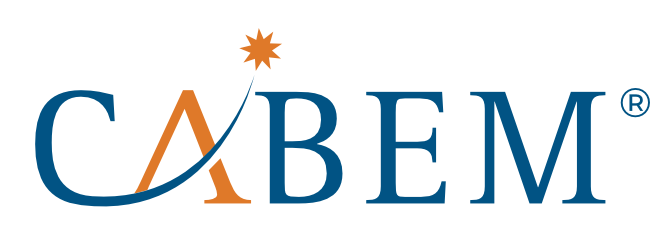With healthcare facilities across the globe struggling to balance concerns of quality care with logistical issues, the necessity of medical competency cannot be overemphasized. At CABEM, we are focused on workforce and competencies management and solutions and have witnessed the transformation of patient care in hospitals due to organized training programs on medical skills.
In this article, let us explain what medical competency is, why hospitals struggle to maintain a high quality of care, and how medical competency enhances the increase in every sphere of a hospital’s work. We will also provide guidance on how hospitals can develop a strong framework of competency that improves the care of patients.
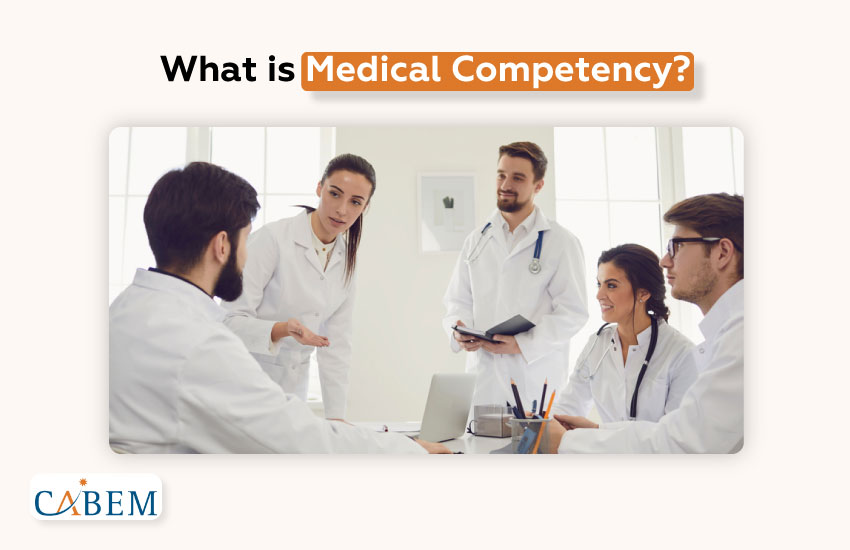
What is Medical Competency?
Medical competency allows the healthcare team to provide safe and effective care by applying knowledge, skills, and behavior. It includes understanding the obligations and boundaries of clinical practice, medical ethics, patient safety protocols, and the legal framework compulsory in healthcare practice.
In the working environment of hospitals, medical competence means that doctors, nurses, technicians, and all healthcare workers are skilled in performing their tasks and are continuously enhancing these skills as the healthcare landscape changes.
Four primary capabilities are required to achieve this competence:
- Knowledge: Comprehensive information about medical and clinical principles.
- Skills: This means the person can efficiently carry out specific medical tasks.
- Behavior: It means being professional, compassionate, and ethical with patients.
- Abilities: Using various technologies, following new rules, and implementing different patient care methods.
If you’re excited to enhance patient care and operational effectiveness, review our detailed blog post on Why Every Healthcare Facility Needs a Competency Manager in 2024.
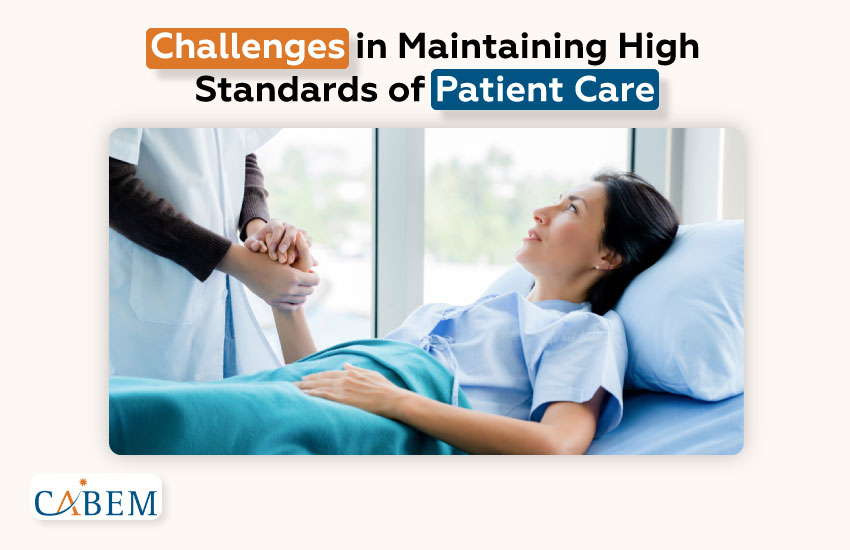
Challenges in Maintaining High Standards of Patient Care
The objective of providing patient care is relatively straightforward, but there are challenges that organizations encounter in ensuring quality care. Some of the most common challenges include:
- Staff Turnover: With high turnover rates, staff knowledge will frequently be lost, leading to inconsistent care delivery.
- Workforce Skill Gaps: Due to the rapid growth in medical technology and treatment approaches, healthcare providers’ skills can quickly become outdated.
- Regulatory Compliance: The complexity of many regulations in the healthcare industry makes hospitals ensure that every worker is compliant.
- Lack of Structured Training Programs: The absence of adequately structured competency frameworks may lead to improper training, which will take time to track and maintain competency levels.
Let’s explore how medical competency can solve these problems. The subsequent discussion will explore seven possible keys to improving care in hospitals and medical centers.
To understand how medical competency frameworks are changing the way medical training and the care of patients are given, we recommend you read our comprehensive report on the “Continuing Medical Education Program Implementation at Harvard Medical.”
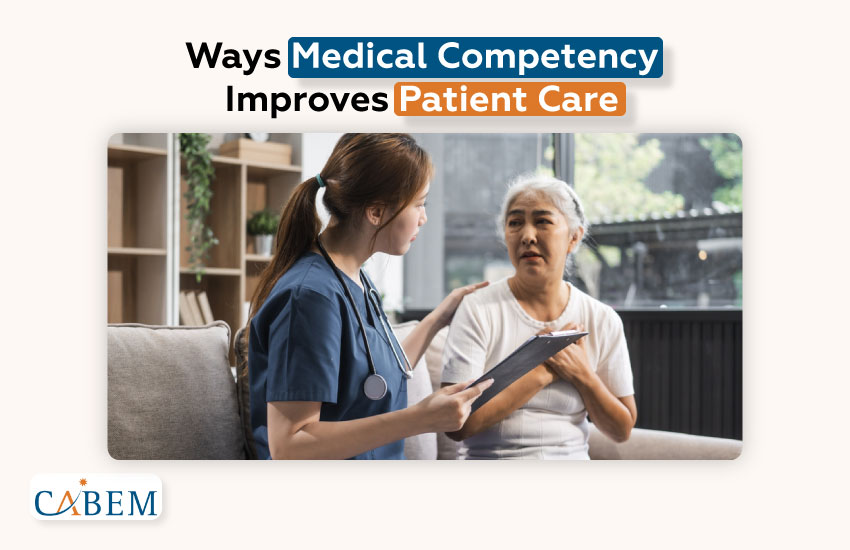
7 Ways Medical Competency Improves Patient Care
What is the impact of improvement in medical competency on the outcomes of patients in a hospital setting? This gets answered through better, more skilled, knowledgeable, and efficient healthcare personnel and will be achieved through a more efficient targeted healthcare team.
Improvement through continuous growth enables improving the quality of care for the patients at every point of interaction within the hospital. Let us move ahead and see how this dedication toward competence brings mutual benefits to the patients and service providers.
1. Enhances Accuracy in Diagnosis
A competent diagnosis is central in taking care of the patient. The development of medical competency ensures that a practitioner understands the relevant skills required to pick up specific diagnostic tools, hence reducing errors and enhancing the care received by the patient.
- Comprehensive training regarding specific diagnostic methods efficiently provides clinicians with operating equipment knowledge.
- Knowledge of clinical guidelines helps the staff to diagnose more accurately so that patients can receive the necessary therapies.
- Experience-based learning to build more substantial skill sets in diagnostic techniques that are more applicable in practice.
Hospitals will avoid high rates of misdiagnosis and enhance the treatment of patients and health outcomes if they constantly evaluate and revise the diagnostic competencies of employees.
2. Improves Patient Safety
The safety of patients is essential in any healthcare system, and CABEM’s healthcare credentialing and competency manager help reduce the risks and chances of medical malpractice. Several crucial practices related to safety are embedded in the medical competency frameworks at all levels of healthcare services.
- Continuous competency evaluations are conducted to ensure that the risks, such as infection, patient handling, and procedures, are all performed with due care.
- Standardized safety protocols make it much more straightforward to ensure all employees are at the same level regarding risk control.
- Simulation-based training allows health workers to train to respond to an emergency within a set time parameter.
When all team members have the required safety competencies, the hospital is first transformed to the patient’s well-being.
- A report published by the Joint Commission demonstrates that establishments with an approved Competency Management structure can significantly reduce the frequency of medical errors and adverse patient outcomes. Hospitals with robust competency programs experience a 20% reduction in patient safety incidents.
3. Boosts Team Collaboration
Consistent patient care is collaborative work. Medical competency, therefore, is not only about skill but also the ability to work across different healthcare roles. A strong team that works together improves communication and provides patient-centered care.
- Interdisciplinary training facilitates healthcare personnel, for instance, physicians, nurses, and laboratory technicians to work together effortlessly.
- Clear role definitions enable team members to clarify their duties and avoid misunderstandings, which cause a waste of time and resources.
- Competency-based evaluations identify gaps in team performance and facilitate their growth as a unit.
Healthcare teams that communicate and work together are more able to respond to and manage complex patients, improving patient care outcomes.
4. Ensures Compliance with Regulations
The healthcare sector is one of the most regulated ones. It is tough to monitor the staff to ensure they are orderly and in line with the regulations because new changes are constantly being implemented. This is where a competency-based framework proves valuable.
- Automated tracking related to compliance ensures that relevant certifications and licenses remain valid.
- Audit-ready reports provide a clear view of competencies and facilitate proving compliance during examinations.
- Regulatory training updates hospital employees with the latest regulations to avoid penalties, lawsuits, and loss of reputation.
Hospitals with defined competency frameworks can meet relevant legislation without all the controversy during the inspection.
5. Elevates Patient Satisfaction
Patients experiencing confidence in their care tend to interact well and have favorable medical outcomes. Medical competency is an essential facet of patient satisfaction, which is dependent upon the high-quality skills of the healthcare provider.
- Competency-based assessments emphasize skills that help deal with people, such as communication skills, empathy, and guiding patients.
- Competency certification assures the patients that they are in the hands of a competent and knowledgeable person.
- Ongoing evaluations assist healthcare providers in becoming more proficient in patient treatment, thus increasing patient trust and fulfillment.
When patients are respected, educated, and loved, they will likely experience good treatment, thus improving patient retention and loyalty.
6. Increases Operational Efficiency
Smooth healthcare systems are necessary to shorten waiting times, provide better care, and optimize resources. Medical competency frameworks aid in making a seamless organization in several areas.
- Optimized workflow: Competency-based workflow optimization guarantees that the most suitable attendees handle tasks.
- Real-time skill assessments: Indicate missed points in training, increasing accuracy and reducing care delay.
- Automated processes: Tracking certifications and competency reporting are mechanized to cut administrative load, which implies that more time will be dedicated to patient care.
Competency-based staff training in hospitals leads to efficient operations in which wastage is minimized and improved care is given.
7. Fosters Continuous Improvement
The advancement in the healthcare sector never seems to end. CABEM healthcare credentialing and competency platform is the building block for continuous improvement, allowing healthcare personnel to do so.to constantly improve themselves by gaining new skills and knowledge.
- Continuous feedback loops allow healthcare practitioners to pinpoint their weak areas and keep pace with technological changes and new developments.
- Personalized development plans allow healthcare professionals to develop and diversify their careers radically.
- Learning culture that involves participation in active training and development programs.
With a continuous improvement culture, hospitals can remain flexible and enhance their quality standards while adapting to the changes in the sector.
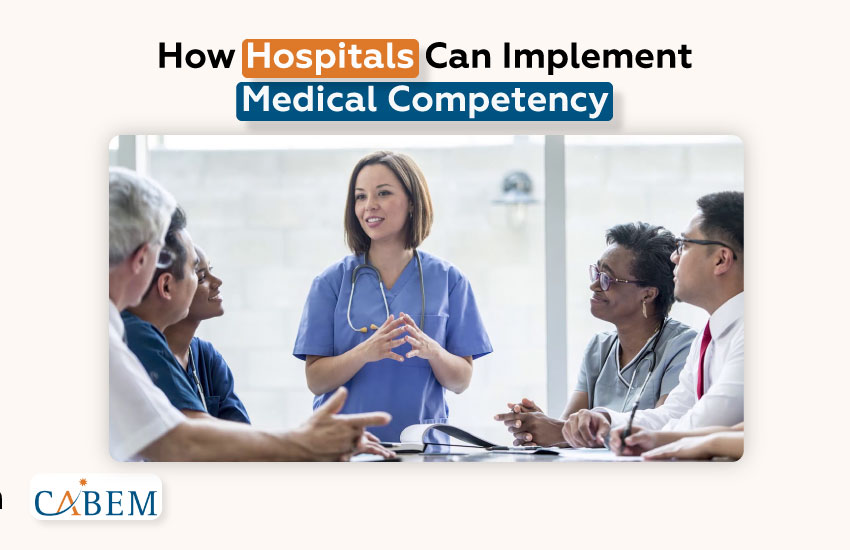
How Hospitals Can Implement Medical Competency
Hospitals must adopt a systemic way of addressing medical competency to improve quality healthcare. This can be done by identifying core competencies, creating training systems, and implementing technologies such as CABEM’s Competency Manager to ensure that the right competencies are always in the workforce.
The solutions provided by CABEM allow hospitals to automate competency management while always giving status updates and ensuring compliance in a single system. The result is improved patient care, greater employee collaboration, and increased operational efficiency.
Are you ready to improve your hospital’s medical competency? Check out how to optimize your training and achieve the desired effect with CABEM’s Competency Manager. Let us help you develop a team that can meet the challenges posed by modern medicine.
FAQs
1. How can the quality of care in hospitals be improved?
Improving the quality of care in hospitals and clinics includes increasing the training of workers, respecting rules, building teamwork, and constantly evaluating and enhancing competencies.
2. What things contribute to improved quality of care?
These include the ability to offer an accurate diagnosis, patient safety, teamwork efficacy, patient satisfaction, operational efficiency, the development of staff, compliance with regulations, and effective management.
3. What challenges do hospitals face without proper competency frameworks?
Without a competency framework, the hospital has to deal with inadequate care, wastage, going against policies, increased chance of medical mistakes, and less patient satisfaction.
4. What specific skills or knowledge are included in medical competency?
Medical Competency includes a set of clinical knowledge and the ability to perform diagnostics, technical skills, communication skills, and an understanding of patient safety techniques and government policies.
